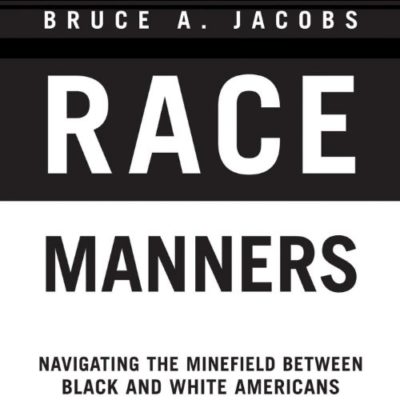Book 1: Race Manners
June 15, 6-8 p.m. Zoom Discussion

Bruce A. Jacobs text offers a template for both white and black Americans to begin having an understanding of thoughts and experiences in many aspects of everyday life from transportation to language and education to music and more. Each chapter offers perspective and a starting point for vital conversations on race. I chose this book first because it immediately makes all members in our group uncomfortable and honestly, in that discomfort we can begin to question, educate and come to an understanding on racial difference.
Discussion Questions
For Discussion:
1. How have September 11, 2001, and the events that followed affected you? Be honest.
- Do you have a personal connection with anyone who was killed, injured, or has suffered severe trauma as a result of the attacks and their aftermath? How has this affected you and your outlook on other people?
- How do you feel about flying?
- How do you feel when you are in a crowd of strangers in an airport, a subway, a shopping mall? Is this the same way you felt before 9/11? How is it different?
- One a scale of 1 to 5, with 5 being the highest,
how watchful of strangers were you prior to
9/11? Now? What do you conclude from this?
2. Have you noticed a stranger and wondered if he or she might pose a danger to you? (This might be a potential terrorist on a plane or a potential robber on the street.)
- What specifically did you notice about this person that made you feel nervous?
- Did you note the person’s race or ethnicity? What was it?
- Did the person notice you noticing him or her? If so, how did that make you feel?
- How did the encounter play out?
- Do you feel your fear was justified? Why or why not?
- If you could do it over again, would you do anything differently? What?
- If you now had the chance to say something to
that person, what would you say?
3. Have you ever felt yourself to be the object of suspicions that you might pose a threat? (As a potential terrorist, thief, or attacker.)
4. What do you think is the best possible way for people and pundits to express opinions via the media? What do you think is the worst?
5. If all of the angry talk show hosts disappeared tomorrow, do you think their audiences would redirect their resentments? If so, where?
6. Under what circumstances do you think it’s okay to ask a person of another race his opinion on a racial issue in order to gain a broader perspective? At what point does it become an insulting query about what “their people” think? What makes the difference?
7. How do you feel about modern affirmative action programs?
8. . Since race doesn’t exist as a physiological entity, why talk about race at all? Should we? Why?
9. Do you use the term tolerance? What do you mean when you say it?
10. Deciding when and how to speak up to family, friends, and coworkers about racism is often not easy. How do you make that judgment, taking into consideration both the desire to take care of yourself and the need to right wrongs?
11. Which of the “Ten Most Bigoted Ideas Held by White Americans” did you find most telling? Which of the “Ten Most Bigoted Ideas Held by Black Americans?” Why?
12. Have you ever had, or are you now in, an interracial relationship?
- If so, what are or were the biggest cultural challenges for you, both personally and as a couple?
- Do you think that racism or stereotyping — on your part or your partner’s — has ever been an issue in your relationship?
- Do you feel burdened by the way that outsiders view or comment on your relationship?
- If you could stand on a mountaintop and shout one truthful sentence to the world about your relationship, what would you say?
View our recorded Zoom discussion from June 15.


